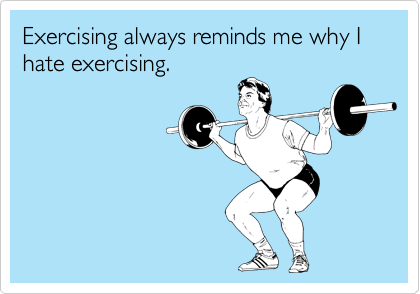Forced Exercise Still Builds Stress Resilience Against Anxiety and Depression

Forced exercise might boost mood as much as exercising voluntarily— a new study suggests that stress-prone people should get moving no matter how much their minds and bodies resist.
Physical fitness is known to reduce anxiety, depression, and other stress-related conditions, but it's notoriously difficult to motivate oneself to move when already down in the dumps, or if one just hates exercise.
Researchers at the University of Colorado at Boulder used an animal model to investigate whether forced exercise can yield the same mood resilience as voluntary exercise.
While conducting background research for their study, physiology professors Benjamin Greenwood and Monika Fleshner came across studies claiming that the psychological experience of feeling in control is necessary for the stress-resisting effects of exercise.
If that were the case, a person who is forced to exercise would be unlikely to get the same benefits as someone who actively wants to work out.
Their results, published in the European Journal of Neuroscience in February, suggest that the role of fitness in warding off stress is not simply a matter of willpower or motivation.
Rats Exercise, Then Get Demoralized
Greenwood and Fleshner decided to test that theory by focusing on the ventral medial prefrontal cortex (mPFC), a brain region that previous studies had implicated in the experience of control and resilience to stress. They designed an experiment which tested the effects of prolonged stress on rats that lacked control over their own exercise patterns.
During a six-week period, adult male rats were split into three groups: one remained sedentary, one had voluntary access to exercise wheels, and the other was forced to run on motorized running wheels for predetermined periods of time.
Three weeks after they began exercising, half of the rats in each group were surgically given lesions in the ventral mPFC region of their brains. After recovering from the surgery, they resumed their previous exercise routines.
At the end of the six-week period, the rats were randomly assigned either to be left alone in their cages or to be uncontrollably and repeatedly shocked with electricity for two hours— a parallel for the uncontrollable life stressors that can make a person succumb to anxiety or depression over time.
After that, each rat was placed in a shuttle box from which it could easily escape when shocks were delivered. The rats that had previously been shocked uncontrollably were more likely to develop what psychologists call learned helplessness— since nothing they did helped them escape from the stressor the first time around, they figured nothing would help this time either. As a result, they were likely to just accept the shocks instead of escaping, like a demoralized person with a mood disorder might stop trying to avoid stressors.
Forced Exercise Still Promotes Stress Resilience
The results showed that both voluntary and forced exercise helped rats avoid the behavioral results of uncontrollable stress. Being in good shape allowed them to learn how to escape from shocks instead of succumbing to learned helplessness, while the sedentary rats were far more likely to lie there and accept the shocks.
"Regardless of whether the rats chose to run or were forced to run they were protected against stress and anxiety," said Greenwood in a news release.
What's more, having lesions in the medial mPFC did nothing to get rid of the benefits of voluntary or forced exercise. The lack of mPFC involvement in the outcome suggests that feeling in control is not necessary for the benefits of exercise in promoting stress resistance.
Rat brains and human brains don't work in exactly the same ways, but the UC-Boulder team believes they are similar enough to draw tentative conclusions from this study.
"The implications are that humans who perceive exercise as being forced— perhaps including those who feel like they have to exercise for health reasons— are maybe still going to get the benefits in terms of reducing anxiety and depression," added Greenwood in his statement.



























